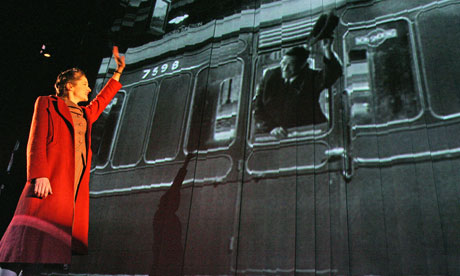
What, you may wonder, is a section on film doing in a study of modern theatre? The fact is that film and theatre have been getting into bed together virtually since the invention of movies. Cinema has always fed off theatrical talent; modern theatre has been shaped by the techniques of cinema. But while it's natural the two forms should interact, I worry that theatre today is becoming lazily dependent on cinematic content.
The first thing to say is that, for over a century, theatre has been enthralled by the movies. In 1911 a Hamburg revue showed a film of Neptune touring the city's streets and entering the theatre door only to appear in three dimensions on the actual stage: exactly the kind of effect that Kneehigh were to imitate and extend in their 2008 version of Noel Coward's Brief Encounter. The real pioneer in the use of film, however, was the German modernist theatre director and producer Erwin Piscator (1893-1966), who in 1925 created a massive historical pageant in Berlin, Trotz Alledem, in which 24 scenes were interspersed with film of the Russian revolution. Brecht, who worked with Piscator, was equally passionate about the movies: Chaplin, Eisenstein and American gangster films were amongst his formative influences, and Brecht's belief that what film demands is "external action and not introspective psychology" shaped his vision of epic theatre.
Today the techniques of cinema affect dramaturgy, direction and design in ways that strike me as both healthy and inevitable. How can you expect dramatists, brought up on film, not to use its methods? In the extreme case of David Hare's Knuckle, you even find Hollywood film noir transplanted to the Surrey hinterland. Directors constantly use film footage or the methods of movie montage: Rupert Goold's Macbeth gained much of its power from documentary clips of Stalinesque May Day parades, and I remember comparing his production of Enron to Citizen Kane in its dazzlingly swift transitions. And where would design be today without the use of projections? Bill Dudley's design for Tom Stoppard's The Coast of Utopia gave us panoramic vistas of the Russian countryside that could not have been matched by wood and canvas.
It would be pointless for theatre to turn its back on cinema. It also seems to me a thing of wonder that you can sit in movie-houses around the globe and watch live productions transmitted from Britain's National Theatre or New York's Metropolitan Opera. But, while the techniques of cinema have changed theatre and talent commutes between the two forms, I worry about the influx of movie content: especially when it comes to musicals. Scan the London listings at the moment and it's hard to find a recent or upcoming musical that doesn't have celluloid origins: Legally Blonde, Shrek, Ghost and The Wizard of Oz are shortly to be joined by Singin' in the Rain and Top Hat. You can, of course, totally re-conceive a movie, as happened with Graham Linehan's version of The Ladykillers, which turned Ealing comedy into healing farce. I just wish the writers of new musicals would occasionally look beyond Hollywood hits for their inspiration.
What can't be denied, however, is that theatre has benefited hugely from cinema, or that there is nothing new under the sun. I marvelled recently at the way the young company 1927's The Animals and Children Took to the Streets incorporated live actors and animation. I then turned up pictures of a Piscator production from 1926, in which drawings by George Grosz were projected on to triple screen in remarkably similar fashion. Plus ça change, plus c'est la même show?
Invaluable reading: The Theatre of Erwin Piscator by John Willett (Eyre Methuen)
Don't mention: Kneehigh's The Umbrellas of Cherbourg.

